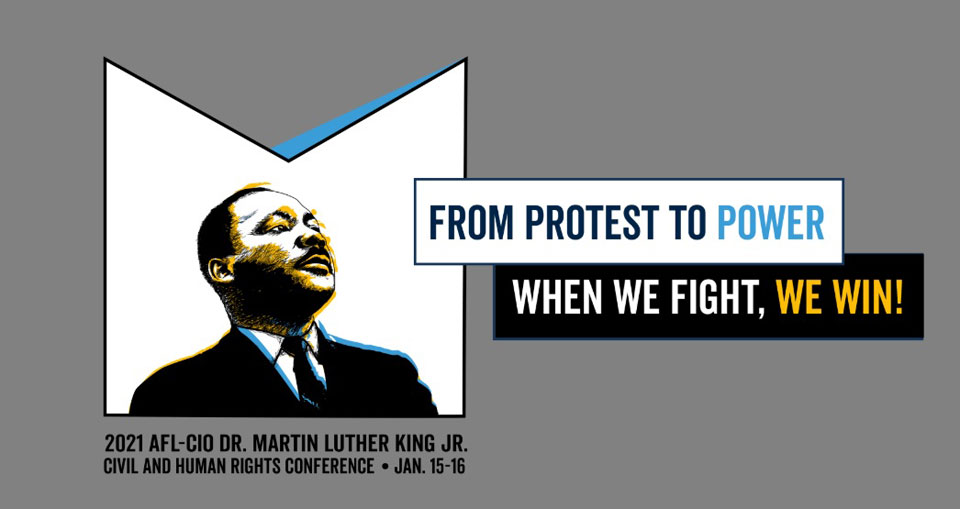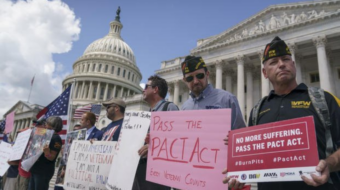
WASHINGTON—Organizers of the AFL-CIO’s annual Martin Luther King Conference are pledging to use it to “build on past victories,” but they also can’t escape the shadow of past events—especially the radical rightist and white nationalist invasion of and insurrection at the U.S. Capitol on Jan. 6, marshaled by since-impeached GOP Oval Office occupant Donald Trump.
Thanks to the coronavirus pandemic, this year’s conference, on Jan. 15-16, is both free and virtual, with participants zooming in from all over the U.S., rather than traveling to D.C.s Convention Center.
This is just as well, as downtown Washington is an armed camp of high steel fences, concrete Jersey barriers, 20,000 police and National Guards, other militarized forces on the way, and curtailed transportation, all with the goal of preventing a repeat of the early-January invasion when Democrat Joe Biden is inaugurated on Jan. 20.
And it’s Biden’s administration that conference attendees are looking towards when they convene.
“We’re done talking about what 2020 has taken from us. Let’s talk about what we built together. Let’s talk about what we’ll fight for in 2021,” the conference announcement says.
“Thousands of organizers and activists protested across the country, demanding to be heard as they said, ‘Black Lives Matter,’” it continued. “Millions of people elected Joe Biden and Kamala Harris to the White House, winning a labor-friendly administration and the first African American and Indian American woman as vice president.
“With that inspiration, the theme for the 2021 Martin Luther King, Jr. Civil and Human Rights Conference is From Protest to Power: When We Fight, We Win. We will gather virtually to build on our victories and strategize about the continued fight for economic and racial justice with—and also within—the labor movement.”
AFL-CIO President Richard Trumka, who opened the conference on Jan. 15, is likely to hit on that theme. He did so while setting out labor’s agenda for this year on Jan. 12 and in a Jan. 11 statement on the linkage between unions and democracy. Other speakers will include top AFL-CIO leaders and union presidents, and the conference will still have a variety of seminars on every issue from Black Lives Matter to criminal justice reform to economic inequality.
“As we start to rebuild” the nation and the economy from the coronavirus pandemic, “we must remember that any hope for recovery is impossible without equity,” Trumka explained in unveiling the federation’s agenda for 2021.
“That is why racial justice is a key component. Structural racial inequity exists in nearly every facet of our country. Our workplaces, our health care system, our criminal justice system. This has always been true but never been clearer. It’s why the incoming administration should appoint a racial equity czar. We need someone dedicated to leading an interagency task force that directly addresses racial injustice in all the places it exists.”
But there’s still the racist and white nationalist backdrop of the Capitol invasion and insurrection, aided and abetted by many congressional Republicans—the same Republicans who have spent years oppressing Blacks, Browns, and other people of color.
“Every aspect of the attack on our Capitol on Wednesday was shot through with racism,” Trumka said in that Jan. 11 posting. “The mob brought Confederate flags and Nazi symbols and wore sweatshirts celebrating Nazi death camps. The mob had been organized by a right-wing faction, which extended all the way to the White House, whose real problem with the election was that American citizens of color, in cities like Detroit and Philadelphia, had been allowed to vote and their votes had been counted. “
“The mob was treated with kid gloves…Had the protesters been Black Lives Matter activists or workers on strike, the Capitol would have been ringed with officers in tactical gear. And had people of color tried to break into the Capitol as Trump’s mob did, the response would have been a massacre.”
“The issue here is are we a democratic republic or are we a racial dictatorship? Are we a country where we count every vote until Black and Brown people start voting? Where the rule of law governs unless white people decide to break it?”
“The labor movement’s answer to those questions, and they have been on the table since the founding of our country, is simple. White supremacy and democracy cannot coexist. White supremacy and the solidarity of workers cannot coexist. And we choose democracy and solidarity.”
Conferees will also honor frontline “essential” workers during the pandemic, many if not most of whom are also people of color. But since the MLK delegates can’t go out and rehab houses and work at soup kitchens, or even march in solidarity to the King Memorial—it, too, is ringed with fences—the honor will be virtual.
“Virtual Zoom backgrounds and printable placards will be provided in a toolkit,” the conference program says. “You can also make your own signs honoring these heroes. As a personal touch printed placards or handmade signs can include a message of support and union local names and numbers. This message will be recorded and provided to you for distribution to show how America’s unions stand up in the hardest of times to care for their communities.”










